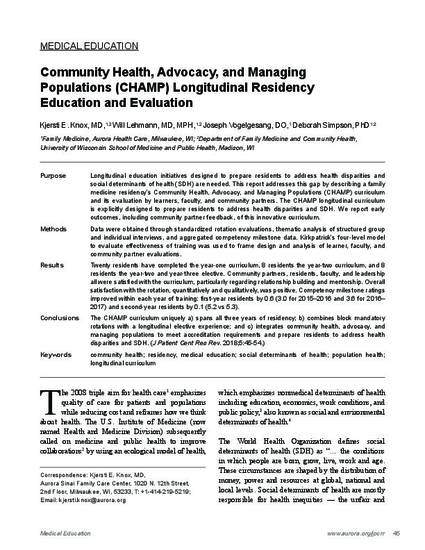
- community health,
- residency,
- medical education,
- social determinants of health,
- population health,
- longitudinal curriculum,
- family medicine
Purpose: Longitudinal education initiatives designed to prepare residents to address health disparities and social determinants of health (SDH) are needed. This report addresses this gap by describing a family medicine residency’s Community Health, Advocacy, and Managing Populations (CHAMP) curriculum and its evaluation by learners, faculty, and community partners. The CHAMP longitudinal curriculum is explicitly designed to prepare residents to address health disparities and SDH. We report early outcomes, including community partner feedback, of this innovative curriculum.
Methods: Data were obtained through standardized rotation evaluations, thematic analysis of structured group and individual interviews, and aggregated competency milestone data. Kirkpatrick’s four-level model to evaluate effectiveness of training was used to frame design and analysis of learner, faculty, and community partner evaluations.
Results: Twenty residents have completed the year-one curriculum, 8 residents the year-two curriculum, and 8 residents the year-two and year-three elective. Community partners, residents, faculty, and leadership all were satisfied with the curriculum, particularly regarding relationship building and mentorship. Overall satisfaction with the rotation, quantitatively and qualitatively, was positive. Competency milestone ratings improved within each year of training: first-year residents by 0.6 (3.0 for 2015–2016 and 3.6 for 2016–2017) and second-year residents by 0.1 (5.2 vs 5.3).
Conclusions: The CHAMP curriculum uniquely a) spans all three years of residency; b) combines block mandatory rotations with a longitudinal elective experience; and c) integrates community health, advocacy, and managing populations to meet accreditation requirements and prepare residents to address health disparities and SDH.
Knox KE, Lehmann W, Vogelgesang J, Simpson D. Community Health, Advocacy, and Managing Populations (CHAMP) longitudinal residency education and evaluation. J Patient Cent Res Rev. 2018;5:45-54. doi: 10.17294/2330-0698.1580
